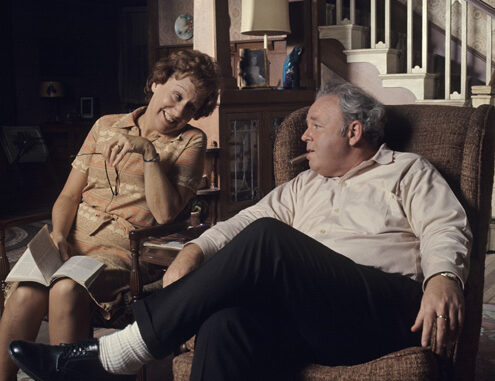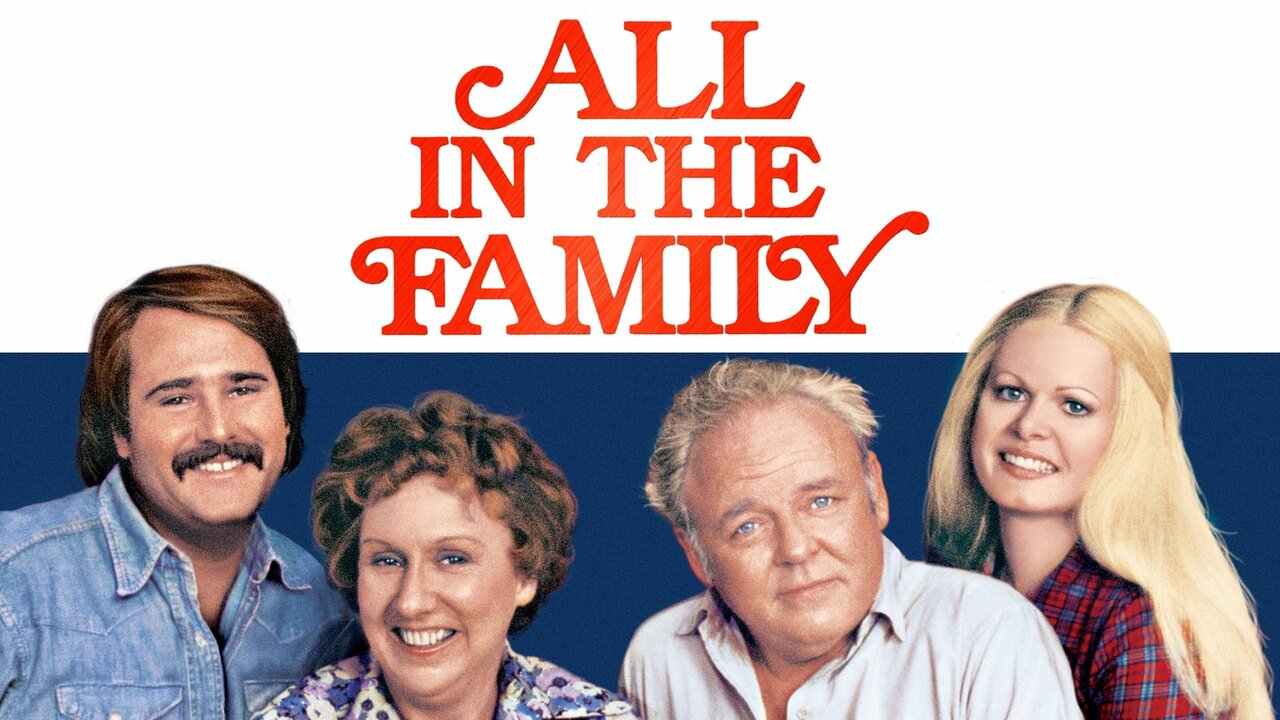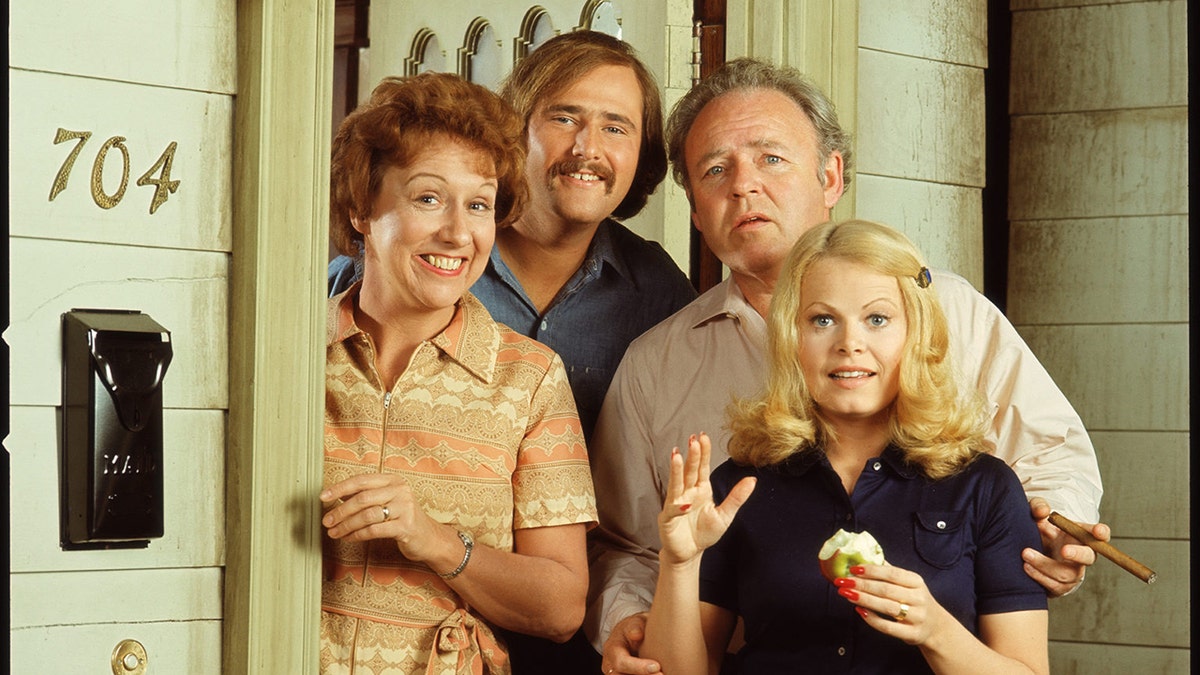
‘‘The program you are about to see is All in the Family. It seeks to throw a humorous spotlight on our frailties, prejudices, and concerns. By making them a source of laughter, we hope to show—in a mature fashion—just how absurd they are.’’

That was the disclaimer that CBS ran prior to the very first episode of All in the Family. The Norman Lear creation didn’t just push the envelope, it sealed and stamped it as well. But viewers kept tuning in week after week to see stories about previously taboo topics, such as menopause, rape, homosexuality, and race relations. Crack open a can of cling peaches (in heavy syrup) and enjoy this smelting pot of behind-the-scenes tidbits.
That was the disclaimer that CBS ran prior to the very first episode of All in the Family. The Norman Lear creation didn’t just push the envelope, it sealed and stamped it as well. But viewers kept tuning in week after week to see stories about previously taboo topics, such as menopause, rape, homosexuality, and race relations. Crack open a can of cling peaches (in heavy syrup) and enjoy this smelting pot of behind-the-scenes tidbits.
1. THE SHOW WAS BASED ON A BRITISH SITCOM.

Norman Lear bought the rights to Till Death Do Us Part in the late 1960s after reading about the BBC series, which ran for 10 years beginning in 1965, in Variety. Alf Garnett (Warren Mitchell) was a working-class conservative who lived in London’s East End with his wife, daughter, and liberal layabout Liverpudlian son-in-law. Alf had opinions on just about everything, and was quite vocal in his dislike of Americans, Catholics, homosexuals, and anyone else who was “different” than him.
2. ARCHIE BUNKER WAS ORIGINALLY ARCHIE JUSTICE.
Lear thought that the BBC show’s set-up—a middle-aged, blue collar conservative man who never hesitated to express his racist viewpoints, his doting wife, and his liberal daughter and son-in-law—could be mined for humor for American audiences. Justice for All, as the show was called in his original pilot script, starred Carroll O’Connor as Archie Justice and Jean Stapleton as his wife, Edith. Kelly Jean Peters and Tim McIntire rounded out the cast as Gloria and Richard (Meathead’s original name). ABC passed on the show, however; their main complaint being Archie and Edith’s lack of chemistry with the younger actors. Lear recast the roles with Candy Azzara and Chip Oliver, changed the name of the show to Those Were the Days and shot a new pilot, but ABC was still uninterested.

3. CBS’S “RURAL PURGE” HELPED ALL IN THE FAMILY TO FINALLY GET ON THE AIR.
When Robert Wood became president of CBS in 1969 he made a bold move and cancelled several of the network’s long-running (and still-successful) “rural” shows, including Green Acres, Petticoat Junction, The Beverly Hillbillies, and Mayberry R.F.D. The latest market research showed that advertisers were attracted to a younger demographic, which to Wood meant less corn pone and more cutting-edge and socially relevant shows. Norman Lear’s revamped pilot—now called All in the Family and co-starring Sally Struthers and Rob Reiner as Gloria and Michael Stivic—was deemed relevant enough and premiered on the network in 1971 as a summer replacement series.
4. MUCH OF ARCHIE BUNKER WAS BASED ON NORMAN LEAR’S FATHER.
Herman Lear frequently told his son that he was the “laziest white kid I’ve ever seen” and called him “Meathead.” He also referred to his wife as a “Dingbat” and told her to “stifle.” (In an affectionate way, of course.) “King” Lear, as he was known to his family, also had a living room chair reserved for his use only. And the reason that the characters on not only All in the Family, but all other Norman Lear productions, seemed to be constantly shouting is because the entire Lear family always seemed to speak at top volume.
5. MICKEY ROONEY TURNED DOWN THE ROLE OF ARCHIE.
When Norman Lear pitched the series to Rooney, he only got as far as describing Archie as “a bigot who uses words like ‘spade’” before Mickey interrupted him. “Norm,” said the actor with a penchant for shortening names, “they’re going to kill you, shoot you dead in the streets.” Carroll O’Connor read for the role after Rooney’s refusal and had landed the part by the time he got to page three of the pilot script. But even he was dubious about the show and told Lear that CBS would cancel it after six weeks tops.
6. THE FUTURE MRS. REINER ALMOST PLAYED MRS. STIVIC.
Rob Reiner’s girlfriend (and eventual wife) Penny Marshall was a finalist for the role of Gloria. She and Sally Struthers were each summoned before the “suits” to read lines and do improv with Reiner (who had already been cast as Michael Stivic). Since Reiner and Marshall were living together at the time, Struthers had a feeling that Reiner would intentionally work better with Penny, so she went into the final audition without nerves and just gave it her all. Years later she asked Lear why she’d been chosen, and the producer told her that Penny Marshall had given a better reading, but that she resembled Jean Stapleton too much. He explained that it had been decided that Gloria would be Daddy’s Little Girl, so (with brutal honesty) she’d gotten the part because she had “a fat face and blue eyes like Carroll O’Connor.”

7. CBS WANTED “EDGY,” BUT WITHIN REASON.
While the scripts for the 13 contracted episodes were being written, Lear received a memo from the CBS Program Practices department detailing the words and phrases that should be avoided at all costs (based on their focus group research). For example, the network requested that homosexual terminology should be kept to a minimum—that “queer” and “fairy” should be used sparingly, and “regular fella” was preferable to “straight.” Lear’s response to these admonishments was to ignore them, as can be witnessed in the fifth episode of the first season, “Judging Books by Covers”:
